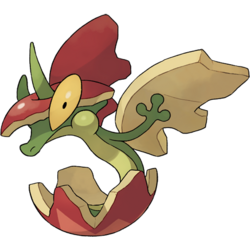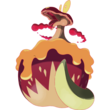From Bulbapedia, the community-driven Pokémon encyclopedia.
Flapple (Japanese: アップリュー Appuryū) is a dual-type Grass/Dragon Pokémon introduced in Generation VIII.
It evolves from Applin when exposed to a Tart Apple. It is one of Applin's final forms, the other being Appletun. It also has a Gigantamax form.
Biology

|
This section is incomplete.
Please feel free to edit this section to add missing information and complete it.
Reason: Describing Gigantamax Flapple's apearance
|
Flapple is a green worm-like dragon Pokémon with a light green underside and yellow eyes. It uses parts of an apple to form its body. It has one part on the top of its head with a single horn sticking out, one on the bottom that is attached to its tail and two parts as wings that are attached to two limbs with three-claw hands.
Its cheeks store acid strong enough to induce chemical burns, which it is able to spit at its targets. It can disguise itself as an apple by folding its apple peels.
When exposed to Gigantamax energy, Flapple changes into the shape of a giant apple. The sweet nectar that covers its body increases in thickness, allowing it to absorb more damage than normal. It can shoot out nectar, enough to be able drown its opponents in the blast of nectar. Flapple can produce significantly more sweet nectar. An intensely sweet aroma of nectar pours out when it stretches its neck, and this aroma is so sweet it can cause other Pokémon to faint by merely taking a sniff of the scent.
Flapple is the only known Pokémon capable of using the move Grav Apple and exclusive G-Max Move G-Max Tartness.
In the anime
Major appearances
Minor appearances
In the manga
In the TCG
Game data
Pokédex entries
Flapple
| This Pokémon was unavailable prior to Generation VIII.
|
| Generation VIII
|
|
|
Galar
#206
|
| Sword
|
It ate a sour apple, and that induced its evolution. In its cheeks, it stores an acid capable of causing chemical burns.
|
| Shield
|
It flies on wings of apple skin and spits a powerful acid. It can also change its shape into that of an apple.
|
|
|
Gigantamax Flapple
| This Pokémon was unavailable prior to Generation VIII.
|
| Generation VIII
|
|
|
Galar
#206
|
| Sword
|
Under the influence of Gigantamax energy, it produces much more sweet nectar, and its shape has changed to resemble a giant apple.
|
| Shield
|
If it stretches its neck, the strong aroma of its nectar pours out. The scent is so sickeningly sweet that one whiff makes other Pokémon faint.
|
|
|
Game locations
| This Pokémon was unavailable prior to Generation VIII.
|
|
|
Stats
Base stats
| Stat
|
Range
|
| At Lv. 50
|
At Lv. 100
|
70
|
|
130 - 177
|
250 - 344
|
110
|
|
103 - 178
|
202 - 350
|
80
|
|
76 - 145
|
148 - 284
|
95
|
|
90 - 161
|
175 - 317
|
60
|
|
58 - 123
|
112 - 240
|
70
|
|
67 - 134
|
130 - 262
|
Total: 485
|
Other Pokémon with this total
|
- Minimum stats are calculated with 0 EVs, IVs of 0, and (if applicable) a hindering nature.
- Maximum stats are calculated with 252 EVs, IVs of 31, and (if applicable) a helpful nature.
|
Type effectiveness
| Under normal battle conditions in Generation IX, this Pokémon is:
|
|
|
|
|
|
|
|
|
|
|
|
|
Learnset
|
|
|
|
- Bold indicates a move that gets STAB when used by Flapple
- Italic indicates a move that gets STAB only when used by an Evolution of Flapple
|
|
|
|
|
- Bold indicates a move that gets STAB when used by Flapple
- Italic indicates a move that gets STAB only when used by an Evolution of Flapple
|
|
|
|
|
- Moves marked with an asterisk (*) must be chain bred onto Flapple in Generation VIII
- Moves marked with a double dagger (‡) can only be bred from a Pokémon who learned the move in an earlier generation.
- Moves marked with a superscript game abbreviation can only be bred onto Flapple in that game.
- Bold indicates a move that gets STAB when used by Flapple
- Italic indicates a move that gets STAB only when used by an Evolution of Flapple
|
|
|
|
|
- Bold indicates a move that gets STAB when used by Flapple
- Italic indicates a move that gets STAB only when used by an Evolution of Flapple
|
|
|
|
|
- Bold indicates a move that gets STAB when used by Flapple
- Italic indicates a move that gets STAB only when used by an Evolution of Flapple
|
Evolution
Forms
Gigantamax
Trivia
- Flapple and Appletun have physically identical Gigantamax forms, but they are still treated as different Pokémon as they have distinct Pokédex entries and G-Max Moves.
- Flapple and its evolutionary family are the only Pokémon that are in the Grass and Dragon Egg Groups.
Origin
Flapple may be based on the larvae of Codling moths, which burrow into apples and feed on their cores, while also sharing visual similarities with geckos. The powerful acid it spits may be a reference to amygdalin, a chemical compound found in apple seeds, which releases cyanide into the body when digested. Its Gigantamax form appears to be based on a caramel apple, and its ability to make Pokémon faint due to its sweetness may be a reference to a diabetic coma. Considering its Dragon typing, it may be a pun on "wyrm".
It may also be inspired by Ladon, a dragon from Greek mythology that guards the golden apples in the garden of Hesperides. In addition, it may draw inspiration from the biblical serpents, sometimes referred to as dragons, one of which persuaded Eve to eat from the forbidden fruit of the Tree of the knowledge of good and evil, commonly depicted as an apple.
Given its flying apple motif and signature move, Grav Apple, Flapple could also be based on the tale of Newton's Apple. Popularized by Voltaire, it claimed the English natural philosopher Sir Isaac Newton had the first thought of his system of gravity upon seeing an apple falling from a tree.
Name origin
Flapple may be a combination of flap and apple.
Appuryū may be a combination of apple and 竜 ryū (dragon).
In other languages
| Language
|
Title
|
Meaning
|
 Japanese Japanese
|
アップリュー Appuryū
|
From apple and 竜 ryū
|
 French French
|
Pomdrapi
|
From pomme d'Api and dragon
|
 Spanish Spanish
|
Flapple
|
Same as English name
|
 German German
|
Drapfel
|
From Drache and Apfel
|
 Italian Italian
|
Flapple
|
Same as English name
|
 Korean Korean
|
애프룡 Aepeuryong
|
From apple and 룡 (龍) ryong
|
 Mandarin Chinese Mandarin Chinese
|
蘋裹龍 / 苹裹龙 Píngguǒlóng
|
From 蘋果 / 苹果 píngguǒ, 裹 guǒ, and 龍 / 龙 lóng
|
 Cantonese Chinese Cantonese Chinese
|
蘋裹龍 Pìhnggwólùhng
|
From 蘋果 pìhnggwó, 裹 gwó, and 龍 lùhng
|
|
|
|
|
|
|
|
Related articles
External links

|
This Pokémon article is part of Project Pokédex, a Bulbapedia project that aims to write comprehensive articles on each Pokémon species, as well as Pokémon groups and forms.
|














